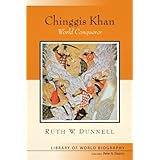
Average Reviews:

(More customer reviews)Ruth Dunnell's concise, yet thorough illumination of Chinggis Khan's life is illustrated in her book Chinggis Khan: World Conqueror. This biography of Chinggis Khan conveys a refreshing perspective on the great khan's life, ensuring that the reader is aware of the positive and negative sides of Chinggis Khan by the end of the book. Though Chinggis Khan is seen by many as a ruthless, heartless man who killed many innocent people, Dunnell maintains a professional mannerism, careful to convey an objective viewpoint . She describes momentous experiences of Chinggis Khan in great detail to accurately portray his life. Dunnell succeeds in depicting Chinggis Khan as an extremely successful and clever man who did not hesitate to take lives and demolish towns in order to achieve his dreams of conquest.
Dunnell is caught in the tough situation of writing about events involving dozens of foreign people and places possessing names unfamiliar to the typical American reader. She provides an extensive glossary and index, as well as some maps to help the reader adjust to the explosion of new terms. Such guidance allows the reader to submerge herself deeper into the life of Chinggis Khan, as his surroundings can be better understood and visualized more vividly. Dunnell's inclusion of such information allows the reader to fully comprehend the roles of Chinggis Khan and appreciate the people and places he interacted with.
Chinggis Khan was first introduced by Dunnell as Temujin, his birth name. Dunnell includes the anecdote of how Temujin was delivered "clutching a blood clot the size of a knucklebone, an apt birthmark for a child of destiny" (21). By including this, Dunnell provides the reader with a positive first impression of Temujin. Dunnell uses this story as a method of foreshadowing the success that Chinggis Khan ultimately achieved.
Chinggis Khan possessed specific characteristics that made him destined for greatness. Dunell describes him as "proceed[ing] with his usual caution and deception" (43) during his conquests. Such traits are extremely important for maintaining success and power-something that Chinggis Khan perfected. In general, c aution prevents leaders from going overboard in conquests and allows for intelligent and well calculated decisions to be made . Deception is vital for the trickery and the element of surprise necessary for taking over nations. Not only was Chinggis Khan cautious and deceptive, but his peers also thought of him as extremely fierce. As a result of this trait, Temujin's name was changed to Chinggis Khan, given to him based on the translated meaning "The Fierce" (49) - a description which fit him very well.
Though Chinggis Khan was a powerful man, Dunnell brings up the point that the tales told about him were probably exaggerated to make him sound even grander. Occasionally throughout the book, Dunnell conveys from other sources that armies mustered by Chinggis rounded up to be hundreds of thousands of men. She explains that "we should not read the names `thousand' or `ten thousand' as a literal measure of the command's strength; these regiments seldom furnished much more than half of a full complement of troops" (51). Nonetheless, Chinggis Khan undoubtedly developed huge armies, especially for the eleventh and twelfth century . Whether the cited numbers are accurate or not is uncertain, but the fact remains that his armies, regardless of the true size, conquered all.
Dunnell continuously points out that Chinggis Khan was not a perfect man. In fact, he made many mistakes in his life and it took him a very long time to achieve some of his goals. "It took Temujin almost ten more years to eliminate his rivals and win over or suppress their followers to become master of the Mongolian plateau" (37). Temujin desired his title of khan for a very long time before achieving it. This might not be known to the average reader who may have assumed that Chinggis Khan, ultimate conqueror, achieved his desires almost immediately.
One of Chinggis Khan's flawed personality traits was his ungratefulness. Though clearly thinking about oneself while conquering is necessary, it is unfortunate that he brought such a mindset into his personal life. One day, a soldier from an opposing army threw an arrow into Chinggis Khan's neck. Because one of his companions was worried that the arrow was poisoned, he spent hours sucking and spitting out the blood from Chinggis Khan's wound in order to reduce the risk of his death. When the khan awoke, he ungratefully remarked, "What is this? Couldn't you have spat further away?" (40). Rather than appreciate his friend's selfless actions, Chinggis Khan responded with annoyance. This interaction between the two displays one of Chinggis Khan's low moments, allowing the reader to judge for herself the man's true nature.
Dunnell's interpretation of Chinggis Khan's life is so meaningful and well-rounded because she took particular care to include both the good and the bad moments of his life . She did not filter out one or the other, thus allowing the reader to make an informed decision about the true nature of Chinggis Khan.
Click Here to see more reviews about: Chinggis Khan (Library of World Biography Series)
Concise and incisive, each interpretive biography in the Library of World Biography Series focuses on aperson whose actions and ideas either significantly influenced world events or whose life reflects important themes and developments in global history.
Click here for more information about Chinggis Khan (Library of World Biography Series)

0 comments:
Post a Comment